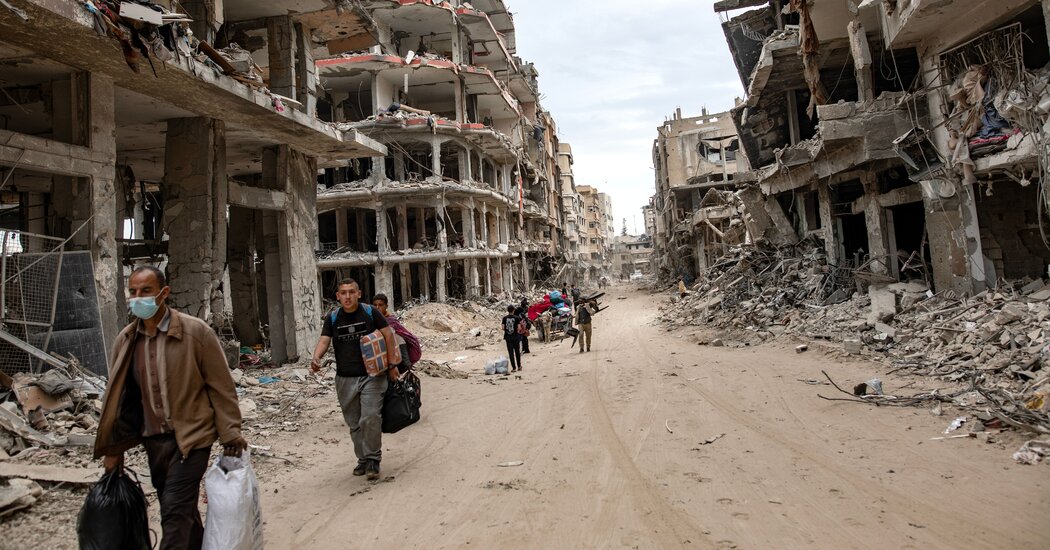Germany on Tuesday defended itself at the International Court of Justice against allegations that it was furthering genocide in Gaza by supplying arms to Israel, saying that such claims were at worst a “deliberate distortion” of reality and arguing that it had long been a staunch supporter of Palestinian rights.
Nicaragua brought the case against Germany to the court in The Hague. In hearings that opened on Monday, Nicaragua argued that Germany was facilitating the commission of genocide against Palestinians in Gaza by providing Israel with military and financial aid, and it asked for emergency measures ordering the German government to halt its support.
Berlin has denied violating the Genocide Convention or international humanitarian law, and sent a delegation of international lawyers, including some from Britain and Italy, to the U.N. court. On Tuesday, Germany argued that Nicaragua’s allegations were inaccurate and rested on an assessment of military conduct by Israel, which is not a party to the proceedings.
“Germany firmly rejects Nicaragua’s accusations,” Tania von Uslar-Gleichen, the human rights commissioner at Germany’s Foreign Ministry and lead counsel in the case, told the court. “They have no basis in fact or law.”
Germany is Israel’s second-largest arms supplier after the United States and a nation whose leadership calls support for Israel a “Staatsräson,” a national reason for existence, as a way of atoning for the Holocaust. But the mounting death toll in Gaza and humanitarian crisis in the enclave have led some German officials to ask whether that backing has gone too far.
“Germany has always been a strong supporter of the rights of the Palestinian people,” Ms. von Uslar-Gleichen said. “This is, alongside Israel’s security, the second principle that has guided Germany’s response to the Middle East conflict in general, and to its current escalation in particular.”
In 2023, Germany approved arms exports to Israel valued at 326.5 million euros, or about $353.7 million, according to figures published by the economics ministry. That is roughly 10 times the sum approved the previous year.
Katrin Göring-Eckardt, a vice president of Germany’s Parliament, told Deutschlandfunk, a public broadcaster, in an interview aired Tuesday that the German government discusses “each individual arms delivery and talks with Israel about compliance with international humanitarian law in this military conflict.”
She cited Germany’s “special responsibility toward Israel,” especially after the Oct. 7 attacks by Hamas that prompted Israel to go to war in Gaza, adding: “Israel’s existence is a matter of state for us.”
On Monday, Carlos Jose Arguello Gomez, Nicaragua’s ambassador to the Netherlands, told the court that “it does not matter if an artillery shell is delivered straight from Germany to an Israeli tank shelling a hospital” or goes to replenish Israel’s stockpiles. The case brought by Nicaragua raises new questions about the liability of countries that have supplied weapons to Israel for the war in Gaza.
Lawyers say that Germany is an easier target for a suit than is the United States, by far Israel’s main military supporter. Germany has granted full jurisdiction to the International Court of Justice. But the United States denies its jurisdiction, except in cases where Washington explicitly gives its consent.
Nicaragua’s case is the third before the court in recent months to focus on the Israeli-Palestinian conflict. Earlier this year, the court heard arguments by South Africa that Israel was committing genocide in Gaza and ordered the Israeli government to take steps to prevent such atrocities, although it has not ruled on whether genocide was in fact taking place. Israel has strongly denied the genocide allegations.
Some analysts have suggested that the German government’s stance has hardened since Nicaragua notified Germany on Feb. 2 of its intended court filings. There is also increasing concern that the global outrage is so strong that the perception of unconditional support from Germany was damaging important international relationships.
The foreign minister, Annalena Baerbock, recently noted that Germany is a signatory to the Geneva Conventions and said it would send a delegation to Israel as a reminder of the duty to abide by international humanitarian law.
Christopher F. Schuetze contributed reporting.


